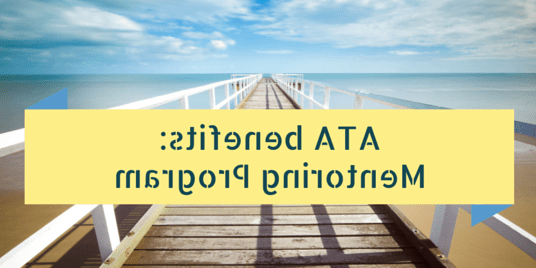How to Have a Super First Year in the ATA: The Mentoring Program

In January 2015 I joined the American Translators Association for the first time and was ready to give it my all. When I logged into my online account with my shiny new member number and password, I felt like a deer in the headlights… How do I make the most of my membership? What resources are available to me? But most importantly, where do I start?
Thanks to all the resources and opportunities available through the ATA website, I got involved in the association as much as I could and closed 2015 feeling that my first year had been super great. I’m sure 2016 has already welcomed many new members to the ATA and I hope to provide some insight as to how to make the most of your year as a rookie through a series of blog posts with The Savvy Newcomer.
One of the first things I did as a new member was apply as a mentee for the Mentoring Program. This year’s deadline is March 5, 2016, so there’s no better time than now to get started on your application.
What is the Mentoring Program?
The program matches a mentee to a mentor for one year (April-March). Most matches are long-distance, so meetings are usually held online for one to two hours per month. If you’re just starting out in the business or are looking to make a career change and need a bit of extra guidance, the program is a great chance to get some extra help from someone with more business experience in the field.
How to Write a Winning Essay
The most important part of your application is writing a 400-word essay. Only 30 mentees are chosen to participate in the program, so you need to write one that makes you stand out. Emily Safrin, a 2015-2016 mentee, recommends staying focused on one or two realistic and measurable goals rather than a sweeping hope: “Not only does it help you as a mentee to be realistic and focused about what you want to achieve, but it also helps the committee to know that a candidate has a concrete plan that they will benefit from and not just a distant and shapeless dream.” Her specific goals included launching a website, creating an appropriate e-mail signature, connecting with direct clients, and setting and negotiating fair rates. “I now have my website and signature, as well as matching business cards,” she said.
In my essay, I specified my main goals as “how to get, work with and keep direct clients in the tourism and hospitality industry” and my secondary goals included improving my online presence and creating a rates chart with fair pricing for the American and Spanish markets. As you can see, being specific about what you want to do is key.
Mentees are in charge of setting the pace of the mentor-mentee relationship, keeping track of their goals and working on them, so make sure you also point out your strengths of working hard, following up and pulling through.
Benefits of Participating
The main thing to keep in mind is that you will get out as much as you put into the program. With her mentor’s help and encouragement, Emily cut off a bad relationship with an agency. “I feel like having [my mentor’s] support has helped me become braver and to create a vision for my career that I hope to see come to fruition in the coming years,” she said.
My mentor helped me see that I need to find a marketing tool that works for me. She pointed out that her main clients have come from encounters at museums or networking events, not from cold calling, emailing or paying office visits (which are all things I personally dread). She has encouraged me to be patient and to take time finding what works for me; a booming business doesn’t happen overnight.
All mentors and mentees also form part of a Yahoo Groups listserv, which is open to questions and discussion. I’ve gotten some great advice from other participants by directing questions to the entire group.
The mentoring program is a great opportunity to get some extra help and a push in the right direction from successful translators and interpreters. Why don’t you give it a try and apply?
To learn more details of what the program entails and find links to apply, please visit The Savvy Newcomer’s recent post on joining the ATA Mentoring Program.
Header image credit: Unsplash
Header image edited with Canva
Author bio

Molly Yurick is a Spanish to English translator specialized in the tourism, hospitality and airline industries. In the past she has worked as a medical interpreter in Minnesota and as a cultural ambassador for the Ministry of Education in Spain. She has a B.A. in Spanish and Global Studies and a Certificate in Medical Interpreting from the University of Minnesota. She is currently living in northern Spain. You can visit her website at: http://yuricktranslations.com

Hi Molly! Thanks for the great overview of the program! Can I ask how long you had been working as a translator before you applied to be a mentee? Do you think that made a difference re: how much you got out of it? Thanks!
Hi Caitlin! Thanks for your comment! I had been translating for about four years when I was accepted into the program. I think it can be useful for translators with all levels of experience. Anyone who is looking to improve or even make a change in their business could definitely apply. As long as you have clear, concise goals the program can be beneficial!
Thanks Molly! I’m definitely going to consider applying.